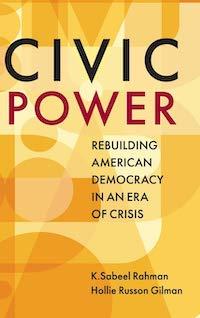
Our Playbook for 2020 and Beyond
Our communities are threatened, and our democracy is falling apart. Why any real solution requires understanding civic power and then building it.

Every day we are reminded how values of democracy and inclusion are threatened—from the weekly tumult in Washington to the ongoing threats facing communities of color and working families across the country.
But as we move into 2020, the reality is that these threats to democracy, racial equity, and economic inclusion are not just about the current administration. They stem from a deeper, more systemic failure of our institutions to empower communities in the face of a changing economy and persistent disparities of economic and political power. The movements we build and the policies we propose in these next few years will shape our country for the next generation.
This moment and how we meet it is at the heart of my new book Civic Power: Rebuilding American Democracy in an Era of Crisis, co-authored with Hollie Russon Gilman. In it, we examine what it would take to restore American democracy and revitalize civic power in an era of democratic inequality.
Civic Power argues that democracy reform at its core has to focus on building and shifting power—and that requires investing in durable grassroots power, on the one hand, and transforming our governance institutions to be more democratically accountable and responsive on the other. This also means that many traditional tools of democracy reform are in fact not powerful or transformative enough to meet the scale of the challenge we face.
Drawing on historical and social science research and case studies of contemporary democratic innovations across the country, Civic Power calls for a broader approach to democracy reform focused on meaningfully redistributing power to citizens. It advocates for both reviving grassroots civil society and novel approaches to governance, policymaking, civic technology, and institutional design. It has the aim of dismantling structural disparities to build a more inclusive, empowered, bottom-up democracy where communities and people have greater voice, power, and agency.
I am thrilled to be able to continue to explore these ideas at Demos. We are deeply committed to both building the independent grassroots power of communities of color and frontline communities, and to innovating bold transformative policy reforms that institutionalize greater democratic accountability and responsiveness. From our work with movement partners to our pioneering of policies that center racial equity and directly empower communities of color in everything from climate policy to economic governance, Demos has continued to be a leader on these issues.
I hope that this book provides insight into what drives our overall work and theory of change and adds an element of urgency to the need for that change.


